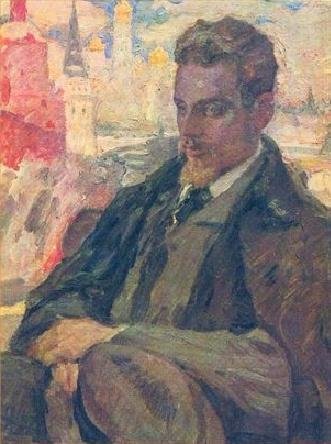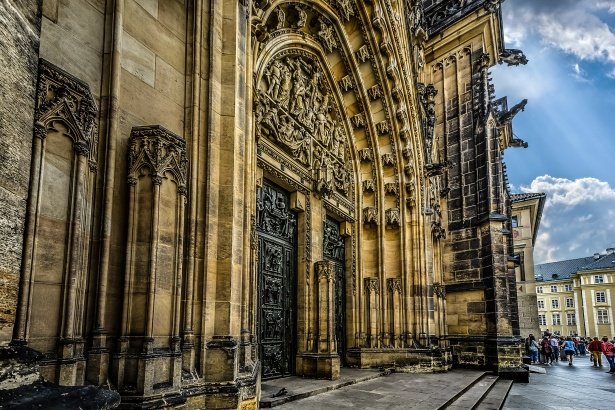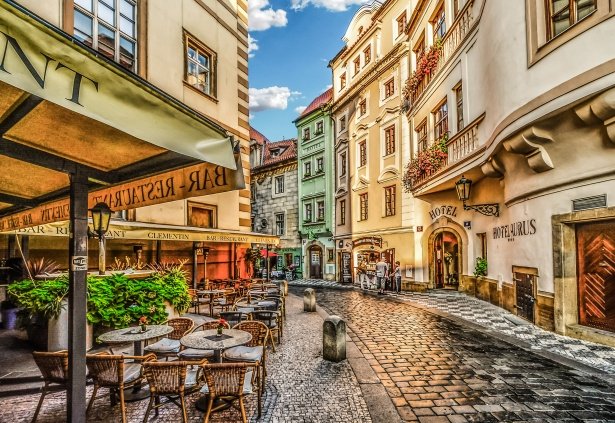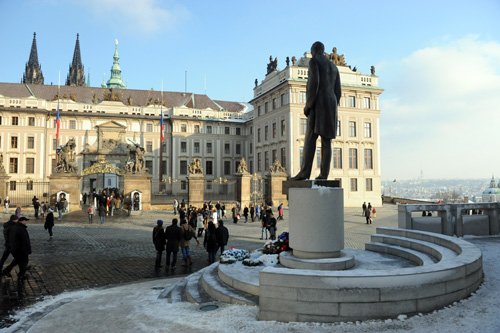ADSactly Literature - Prague Stories by Rilke

Prague Stories by Rilke

Hello, kind readers. Every day, since @velimir has shared images about Prague, I've really wanted to talk about that city. Prague has become a familiar place, a point of reference, in the space that many writers have used to set their stories. In fact, when I hear about Prague or read about it, I can't help thinking about Kafka or Kundera, but today I'm going to refer to another well-known writer born in Prague: Rilke.

As we all know, Rainer Maria Rilke was a writer born in Prague in 1875 and is known as one of the most important poets of universal literature of the first half of the twentieth century. Although his poetic work is more recognized than his narrative work, his prose texts also have much merit. His poetic work is fundamental, and Duino's Elegies and Orpheus Sonnets arouse special interest. His narrative works include Notebooks by Malte Laurids Brigge and Letters to a Young Poet , in which he considers that writing is not an occupation, but rather an instinct that comes from the bowels whose roots "extend to the deepest part of the soul". But today we will not speak of his poetry, today we will speak of a book consisting of two stories: Stories of Prague.

Prague Stories is a book composed of two stories: King Bohusch and The Brothers. Today I would like to deal with the story King Bohusch. This is a story about a hunchback, Bohusch, who after feeling inferior to almost everyone else, begins to feel that he can do and accomplish many things. This way of thinking leads him to act erratically, behavior that will be definitive and lethal for him. It all begins with the meeting of several people, including a writer, a poet, an actor, a student, in a café. It seems that the least important person is precisely Bohusch, who is ironically called king. In this first encounter, we characterize each character and see that the hunchback is introverted, with much pain to express their feelings and opinions. In this encounter, it is the other characters who make themselves heard and express their ideas.
As he leaves the café, Bohusch walks with the student Rezek through the dark streets of Prague. Taking the Tower of St. Vitus as the stage, the hunchback begins to talk about the structures in his environment and their permanence in time. But the way he mentions Prague is surprising:
I know my mother Prague to the heart, to the heart," he repeated as if someone had doubted his assertion.

And he starts talking about the number of buildings in Prague that have hidden clandestine basements and buildings that very few people know about. With this intervention we see how Bohusch sees his city: he calls it "his mother", and with this expression we can feel closeness, knowledge, but also a lot of love. In this first conversation between the hunchback and the student, the latter only pays attention to what he says about the hidden places that very few know, so he asks for more information. Bohusch talks to him about a particular place that is in his house and that nobody knows. After this, Rezek shows interest in continuing to talk to the hunchback and asks him to return to the café, while the hunchback reminds him that they have already been there talking to each other. To which the student responds:
...it's you I want to talk to, Bohusch, not those great gentlemen, those artists.... I wish these people were proud of the people. But believe me, they don't know anything about each other, or their people.
This comment, made very vehemently by Rezek, makes the hunchback feel important and recognized, and he begins not only to look at his interlocutor in a different way, but to look at himself in a different way. We must also point out the meaning of the words pronounced by the Rezek, in which he speaks of the lack of empathy between the writers and the city. According to him, artists are called to write about their hometown, countries, to make them known. The work of the artists must allow us to know and understand the peoples; to record history, the changes that have taken place over time. And he says that unlike what Bohusch may feel for Prague, others do not think or feel his hometown so close:
We are no longer at home here in Bohemia. We have our homeland somewhere unknown, I don't know, at the origin of life.

These words make Bohusch think that he has always had the wrong impression of the student, he would have thought it silly, simply to keep silent within the conversations in the cafe. This same thought applies to him and he understands that silence could have made him pass for a fool too and from that moment on he promises to express himself. So he says:
Sometimes I have thought the same thing. Why do you paint this and not that? Why is it written like that and not in any other way...? However, if you allow me to make the observation that the poets say nothing about Hradschin or Teyn, it doesn't matter, it doesn't matter..... I know my mother Prague from the heart, yes, and no poet has said anything to me.
As we can see, this encounter and these fortuitous words come to create in the hunchback not only the need to communicate, but also the awareness of what it means to speak, to manifest what we think and feel. Moreover, in order to love and know a place, in this case Prague, it is not necessary for writers to write about it, the essential thing is to feel it, to suffer it.

As a result of this encounter, two things happen that are fundamental in the development of history. On the one hand, Bohusch leads the student to know a secret passage, which will be used by the student later, in a clandestine way, as a refuge for political meetings. And on the other hand, Bohusch stops his shyness and starts trying to express everything he feels to everyone. As he talks to himself, he says, "I know what you mean. You are an ugly man. But start talking. Talking beautifies.
Bohusch's need to speak and be heard makes him ask the student for the opportunity to speak at his political meetings, and from these meetings the true personality of the hunchback begins to emerge:
Since then, Bohusch has not slept. He waited day and night for Rezek to call him, and thought of everything he wanted to say... but always, whatever the subject of his speech, he saw himself as the center of this group, as the teacher whom the beautiful Carla and many strong young men blindly obeyed. He felt like the one who has been unjustly ignored for a long time and who finally gains his rightful place and advances through the limits of his time.

In the above quote we observe the restless life that the hunchback begins to live, but in the same way, the resentment and feeling of inferiority that could have lived in him for so many years. This bitterness for having been rejected before, makes him write a letter to a woman, Frantischka, to invite her to his house, because he wants to give her a private speech and as if that were not enough, seeking her admiration, he tells her what he has been doing clandestinely. The result occurs when this woman delivers the letter to the government and the government imprisons many people for rebels. The hunchback who is not imprisoned returns home and there the student arrives and kills him with his own hands.
With this story we think about many things. For example, talking may be more subversive than thousands of cartridges; it may be necessary, but it is also necessary to remain silent. Behind many political discourses is the seed of discontent, which can sometimes be dangerous. We also see the background, the social, the political and the artistic. Art, especially writing, is the most valuable experience that human beings have created to understand themselves. The social function of art evolves from contemplation to interpretation and becomes forms of knowledge. I think that behind the words the student says to the hunchback about artists and Prague is the exhibition of a reality, but also Rilke's veiled opinion about how to take on art in an age.
I hope you were interested and liked this position. Remember to vote for @adsactly as a witness and join our servant in discord. See you next time with a smile.;)

Bibliographic References
https://es.wikipedia.org/wiki/Rainer_Maria_Rilke.
Rainer Maria Rilke (1992). Stories from Prague. Montesinos: Barcelona - Spain.
Written by @nancybriti
Click on the coin to join our Discord Chat

Witness proposal is here:
Go To Steem Witness Page
In the bottom of the page type: adsactly-witness and press vote.

Use small letters and no "@" sign. Or, click here to vote directly!
Thank you!
This is a youth work by Rilke, which captures the atmosphere in Prague in 1900. Barely half a century ago the Czech Republic had separated itself from the Austro-Bohemian Empire, and the silent enmity between the Czechs, also known as 'Bohemers', and the resident Germans, is not only clearly felt; the Czech rebellion is growing subcutaneously and is heading for an explosion.
With this political unrest as background, Rilke paints his characters, and does so in a masterly way. He knows how to give German a rare poetry without becoming woolly, knows how to write far and yet intimately. You are drawn into the thoughts of his characters, their fears and dreams, you walk along with them through the streets of Prague in 1900, and before you know it you're in Café Slavia, bent over a coffee, secretly listening to the conversations of the writers and painters around you.
So it is, @kouba01. When we read part of those passages we believe not only to be within the conversation, but we sense that it is a private conversation to which few should have access. With your comment I remembered that I should have put a part of the preface that this book has and that says:
Thank you for your always accurate and valuable comments. Greetings.
Common, I soaked in everything about this hunchback and learnt a lot. Truth, I've found out that the Eurasia citizens like to call there country a mother, which is very prevalent with Russia. That Boruch called his country a mother wasn't a surprise to me.
What surprised me what his death, why?. But it left a lesson in me that not all words are meant to be spoken and not all revolution could be birthed.
I can go on and on here, but will stop.
Nice read.
You made my day by making me know much about Prague.
Posted using Partiko Android
Yes. Not everything you know should be said or done. This character leaves us many lessons, but I'm left with one: the evil that resentment can do to people. undoubtedly it's a beast that bites from the inside out. Thank you for commenting, @botefarm.
Indeed, they are beautiful photographs.
Prague is very beautiful: a constellation of colours and an impressive sky.
From Rilke I remember with special affection Letters to a young poet. It marked my adolescence (it is a beautiful and hard book). He wrote poetry (I write) and taught me (he teaches me) a lot about poetic depth.
Your judgment on silence (of which Rilke expresses himself with such mastery and knowledge) is true. I haven't been able to resolve my conflicts with this, I lack maturity and, surely, training. My throat degrades by itself, often without control. These are writing problems that I have to rolver (can I?). In any case, reading Rilke again may not be a bad idea.
Thank you for putting me back on that path, dear @nancybriti.
LOL. Good to see you here, dear, @adncabrera. Your lucid comments about literature will surely enrich us a lot. I know how close Rilke is to those of us who write or try to write and, very especially, as you said, his poetics. I thank you for your words. I hope to see you here more often. I embrace you
An attractive text and beautiful images of Prague, @nancybriti. You have approached a central poet of my life and my tastes. Prague, of course, is one of the spatial motifs of Rilke's work. You have given us an illustrative example of this. We can see it in his poetry in verses (I think Rilke's poetry is also in his narrative texts and even in his wonderful letters) and in his tales (I especially like his Histories of the Good God). Although Rilke was not exactly an individual of nationalist thought, he speaks of that Prague that perhaps always accompanied him.
Silence, I believe, is also characteristic of Rilke's work (still in his singular novella of formation, The Notes of Malte Laurids Brigge) and of his personality.
(I have an essay on Rilke that I might dare to publish in Steemit, although it's a bit long and perhaps very much for readers of literature.)
Thanks for your post, @nancybriti, and @adsactly for spreading it. Greetings.
I think it would be good to read that essay, even if it's in parts, if it's very long, @josemalavem. It's always good to read about Rilke and read good texts like the ones you write. Thank you for always commenting and giving us your vision about some texts and their authors. Greetings
Exquisite reading ... Wonder of how Prague feels in its inhabitants, that shows the sense of belonging, the feeling of a child, the love of a land.
Thank you very much for your comment, @jdbs
Hi, @adsactly!
You just got a 0.43% upvote from SteemPlus!
To get higher upvotes, earn more SteemPlus Points (SPP). On your Steemit wallet, check your SPP balance and click on "How to earn SPP?" to find out all the ways to earn.
If you're not using SteemPlus yet, please check our last posts in here to see the many ways in which SteemPlus can improve your Steem experience on Steemit and Busy.
Beautiful place
Posted using Partiko Android
Enlightening posts and very educating
I always look forward to your post because so many new things and information that add to our insight.
As in this post, you chose the writer from Prague and a very interesting piece of the story. Then we can take lessons from the selected story. You present the work of rainer maria rilke, the author who is full of great inner experiences. During childhood with a life journey full of sorrow to pour works both in poetry and prose. But we know how the author's inner experience becomes the background of a work. Movable living conditions also bring relationships with other authors to contribute to the influence when writing. Inner experiences were forced to attend military education even though he was talented in art and writing poetry. Of course this is a lesson for all of us. And your real work and discuss it well.
Thank you @ nancybriti
Thank you @adsactly
Thank you Steemit
Warm regard from Indonesia